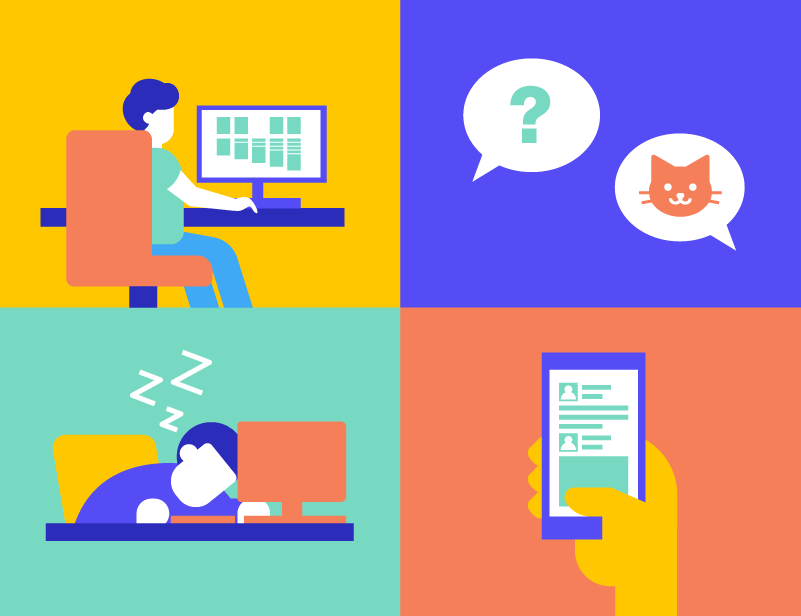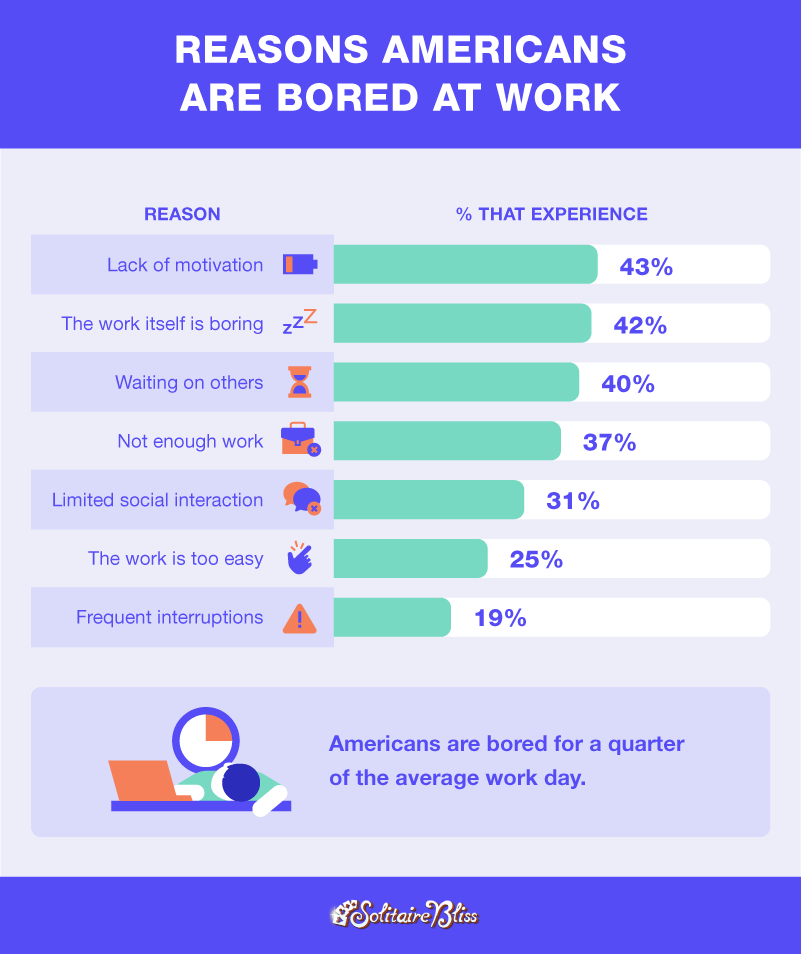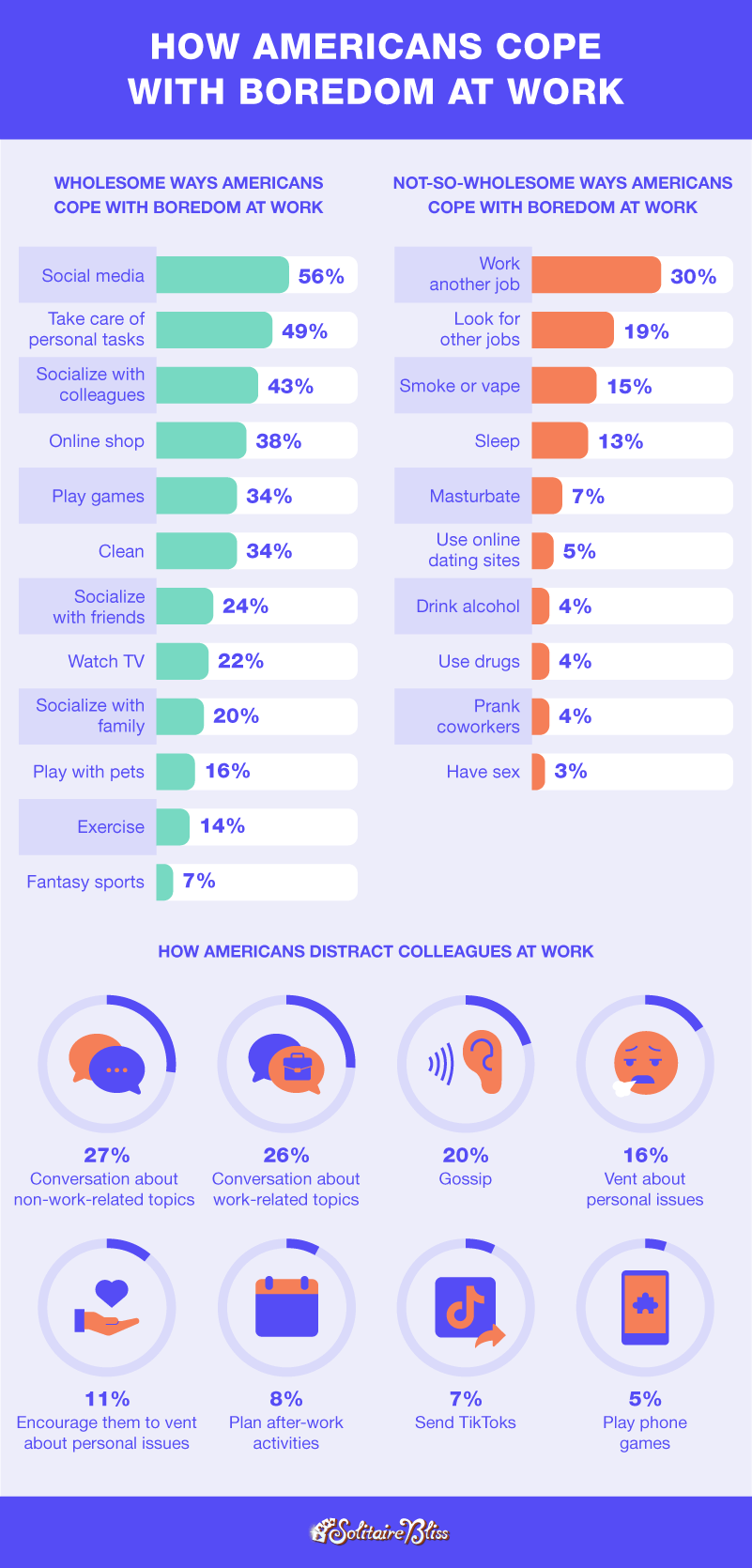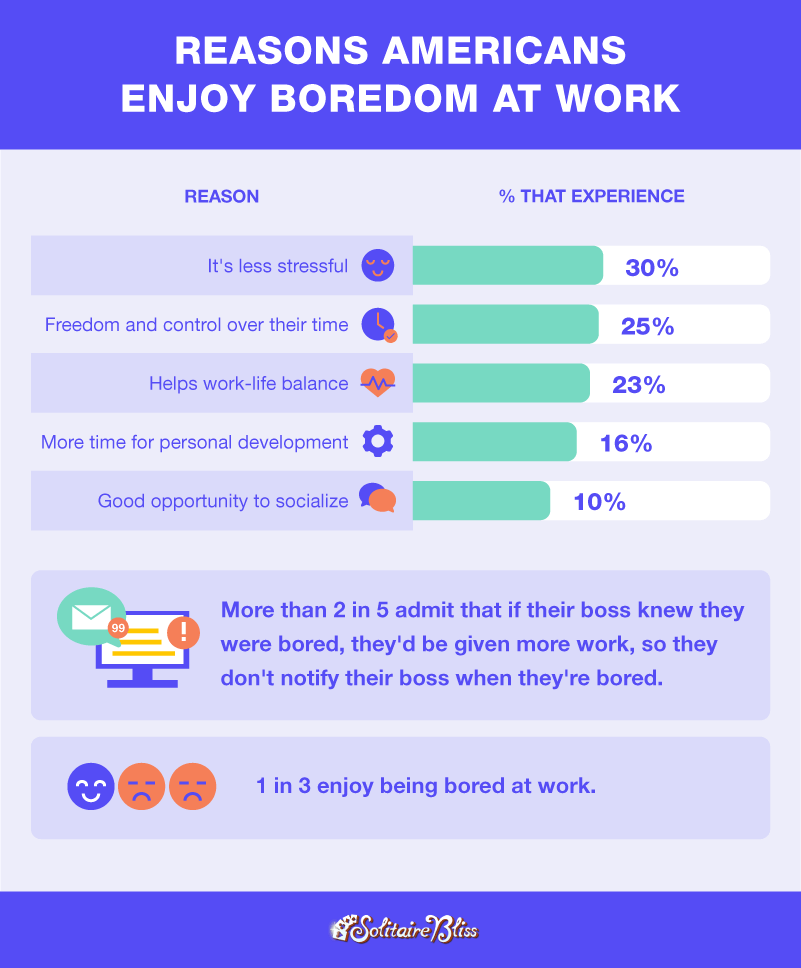Over a Third of Americans Have Found Their Job Boring for Years

Picture this: A quiet office, a steady hum of computers with keyboards clacking, and amidst it all, a game of Solitaire brightly lit on Jessica’s screen. Not far away, Kwame is “adding to cart,” his screen filled with Amazon’s latest deals. And tucked away in her cozy cubicle, Alicia is stealthily managing her Etsy shop, responding to customers’ eager messages.
Within the dynamics of the modern workplace, the myth of consistent, all-day productivity is exactly that—a myth. Let’s face it: Not everyone is firing on all cylinders for 8 to 10 hours a day. We were curious about the nature and frequency of workplace boredom, so we surveyed over 1,000 individuals about the myriad of ways they cope with boredom at work.
We’re not just talking about the occasional game of Solitaire to pass the time; this is a deeper investigation into the human aspect of work, the challenges of maintaining concentration, the dynamics between bosses and employees, and the innovative ways many of us manage our boredom. Let's dive in and uncover the truth about boredom in the American workplace.
Key Findings- Americans are bored for a quarter of the average work day.
- Using social media (56%) is the top way Americans cope with boredom at work.
- Nearly 3 in 10 admit they tend to distract their colleagues when bored at work.
- Over 2 in 5 admit that if their boss knew they were bored, they'd be given more work.
- A third say they enjoy being bored at work.
Lots of Us are Bored at Work—Here’s Why
The issue of workplace boredom is more pervasive than many might realize. According to Forbes, boredom at work is not just a minor inconvenience; it's a serious problem that can lead to depression, anxiety, insomnia, and higher employee turnover.
This issue affects a significant portion of the American workforce, with over a third admitting they have found their job boring for years. Interestingly, a similar proportion of workers even anticipated this boredom when they started their jobs.
Certain sectors report higher levels of anticipated job boredom, with the legal field leading at 45%, followed by technology (41%) and healthcare (36%). The primary causes of boredom are notable as well: lack of motivation (43%), the work itself being boring (42%), and waiting on others (40%).
Frequency of boredom varies across different working environments and demographics. A significant 1 in 3 employees admit to being bored several times per day, with in-office workers (36%) feeling more bored compared to their hybrid (31%) and remote counterparts (31%).
Among different age groups, Gen Zers report the highest levels of boredom (38%), surpassing millennials (34%), boomers (33%), and Gen Xers (29%). Moreover, men (36%) tend to feel bored at work more often than women (31%).
Boredom impacts not only mental health but also productivity. On average, Americans are bored for a quarter of their workday. When bored, 62% of employees work slower or engage in unnecessary tasks to pass the time. This behavior is most prevalent among in-office workers (66%) but is also significant among hybrid (60%) and remote workers (59%).

Social Media Is the Top Workday Discractor
Our data reveals that the top three wholesome methods for dealing with work boredom include using social media (56%), taking care of personal tasks (49%), and socializing with colleagues (43%).
However, there are also less conventional and less wholesome ways that employees cope with downtime at work. Notably, 30% of employees work another job, such as a side hustle, when bored. Another 19% look for other job opportunities, and 15% resort to smoking or vaping as a means to cope with boredom.
And boredom at work doesn't just affect the individual; it has a ripple effect on colleagues. Nearly 3 in 10 workers admit to distracting their colleagues when bored; an issue most prevalent in certain industries with construction workers (43%), those in food services (42%), and government positions (40%) being the most likely to distract others.
Demographically, millennials (30%) are more prone to distracting their colleagues when bored compared to Gen Z (26%), Gen X, and Boomers (both at 24%). Men (29%) also tend to distract their colleagues slightly more than women (25%). With this, the primary means of distraction is through conversation, encompassing both non-work-related (27%) and work-related topics (26%).

Employees Admit Their Boss Knows About Their Boredom
As Phys.org points out, boredom is linked to increased counterproductive practices like distraction and absenteeism, which could negatively impact workplace performance and career advancement.
However, a majority of employees (70%) do not believe that boredom at work affects their career progression. This perspective varies across industries, with those in the legal field (88%), real estate (79%), and creative fields (63%) particularly inclined to hold this view. There's also a notable gender difference, as 75% of women feel that boredom doesn’t impact their career progression, compared to 66% of men.
More than 2 in 5 employees admit that they avoid notifying their boss about their boredom due to the fear of being assigned more work. This sentiment is most prevalent among hybrid workers (48%), followed closely by in-office (45%) and remote workers (39%). Millennials (48%) are most likely to withhold boredom from their bosses, slightly more than Gen X (41%), Gen Z, and boomers (both at 39%).
Despite these concerns, a majority of employees (57%) say that their bosses are aware of their frequent boredom. However, as long as the work is completed, these bosses seemingly do not intervene. This situation is more commonly reported by in-office employees (61%) compared to their remote (53%) and hybrid (52%) counterparts.
Furthermore, over a third report that their bosses are aware of their boredom but are indifferent, possibly because the bosses themselves are also bored. This scenario is most commonly reported in the food services industry (58%), followed by real estate (55%) and advertising/marketing (42%).
A Third Actually Enjoy Boredom at Work
Contrary to common perceptions about workplace boredom, a significant portion of American workers find a certain level of enjoyment in it. In fact, a third of employees actually enjoy being bored at work, with various reasons contributing to this unexpected preference.
The top reasons why Americans enjoy being bored at work include experiencing less stress (30%), having more freedom and control over their time (25%), and the perceived benefit to their work-life balance (23%). These factors suggest that some employees may view periods of boredom as opportunities for relaxation and autonomy within the workday.
This enjoyment of boredom is particularly common in certain sectors. Employees in the legal field and real estate, both at 45%, report the highest levels of enjoyment from being bored at work, followed by non-profit employees at 39%.
The preference for boredom also varies based on the work environment. Remote employees, at 38%, are more likely to enjoy being bored compared to those in-office (31%) and hybrid (30%). This could be due to the greater flexibility and privacy that remote work offers, allowing employees to use periods of boredom more constructively or relaxingly.
Among different generations, millennials (37%) and Gen Z (36%) report the most enjoyment from workplace boredom, surpassing Gen X (31%) and boomers (13%). This generational difference could reflect varying attitudes towards work and the role it plays in one's life.
Interestingly, there is also a gender difference in the perception of workplace boredom, with over a third of men admitting to enjoying it, compared to 3 in 10 women. This could indicate differing expectations or experiences of work between genders.

Next Time You Need a Mental Break, Play a Game of Solitaire
Clearly, mental breaks are necessary for maintaining employee happiness. Whether it’s playing a game FreeCell or Spider Solitaire, or scrolling through Instagram, these activities represent the diverse strategies workers use to calm their minds amidst the monotony of routine workplace tasks.
In recognizing and understanding the nuances of workplace boredom, employers and employees alike can work toward creating a more dynamic and supportive work environment, where brief interludes of personal tasks are viewed not as distractions, but as necessary pauses that foster long-term engagement and productivity.
Methodology:
On November 22, 2023, We surveyed 1,002 Americans about the ways they experience boredom at work. Respondents ranged in age from 18 to 76 years old, and were 48% female, 50% male, and 2% nonbinary.
Back to the Homepage

